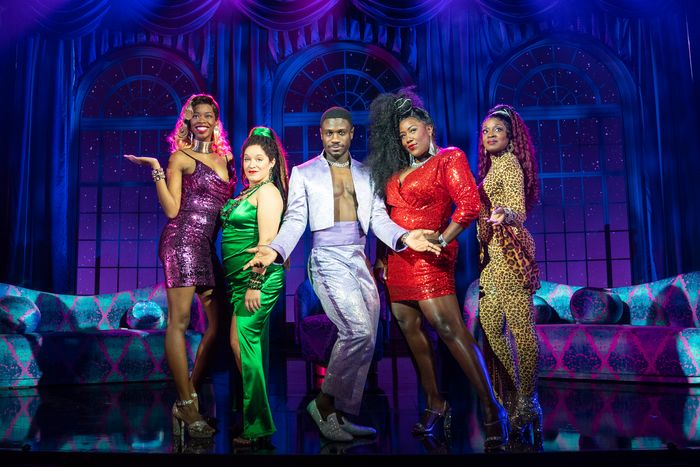
It’s a delight to have Jordan E. Cooper kick down the door of Broadway in heels and storm onstage with something as raucous as Ain’t No Mo’. The show’s whirligig satire seems to gain momentum by sending up its very environs, a series of sketches built around a recurring conceit wherein Cooper, in drag as a flight attendant named Peaches, desperately tries to coordinate the onboarding for a government-funded flight taking Black Americans back to Africa. It’s a show that’s bawdy and bold and uninterested in seeming respectable, but it’s also fascinated by respectability, the question of who might leave or stay on that flight, who might embrace their Blackness and who might try to bury it. Cooper sees you there in the audience thinking he might’ve buttoned up his ideas for the Belasco Theatre, and he cackles in defiance.
Ain’t No Mo’ begins with a funeral, where Marchánt Davis in full grandiosity as a pastor mourns the death of “Brother Righttocomplain.” It’s 2008, and the president-elect is — as Davis urges the audience to say it with him — Black. Cooper quickly sucks the bubbles out of the ebullience, though, as he works toward his satirical aim, juxtaposing the optimism of that moment with the subsequent decade-plus of unfulfilled potential. Scott Pask’s set puts a giant cross behind the bedecked coffin, and as Adam Honoré’s lighting dims to darkness and red, Jonathan Deans and Taylor Williams’s sound design incorporates chillingly familiar audio clips of police killings. It’s a hell of a way to start a comedy, and it establishes the breadth of what Cooper is planning to cover over the course of 90-plus minutes, from lighthearted absurdity right down to fury.
The sketches then provide a series of variations on those themes, each giving a showcase to Ain’t No Mo’s incredibly agile and all-in ensemble. Davis returns as a ringleader in a send-up of a Real Housewives–esque reunion special of Real Baby Mamas of the Southside, where Ebony Marshall-Oliver and Shannon Matesky face off as onscreen nemeses, their animosity fueled by the fact that Matesky’s character is a Rachel Dolezal type who claims to be trans-racial. Cooper takes the initial premise of a catfight, telegraphs that it’s all scripted (we hear a white voice giving instructions, trying to egg on the cast members further), and then brings in another, real fight on top of that. In a later sketch, the focus shifts to Fedna Jacquet as a brittle Clair Huxtable–esque wealthy conservative Black woman and Crystal Lucas-Perry as the spirit of Blackness whom Jacquet’s character’s father imprisoned in his basement long ago. Under Stevie Walker-Webb’s direction, the idea seems to be to go as big as possible, and see what disconcerting truths wiggle out from the blast zone.
The core (pit?) of the thing is Cooper’s performance as Peaches, at once high camp and deeply felt. She’s been tasked by The Powers That Be with checking everyone into the last flight from the U.S. to Senegal, before everyone departs from there to whichever destination most closely fits with their ancestry (Cooper both uses the idea as a Big Unexplained Metaphor and delights in hinting at the ludicrous logistics that would be involved). She’s exhausted by the process and fed up with her community. In between checking boarding passes with a bedazzled scanner (the props, scaled up by a Broadway budget, are routinely delightful), she reveals that she was attacked by a group of Black men the night before. Cooper’s animating idea with her, as he told New York, is to ask, “What would it be like if Black people had to depend on the Blackest, queerest person?” He wants to transplant that very Black, very queer sensibility to Broadway too. In a speech after the opening, when I saw the show, he said he wanted to “let the theater know that chitlins can be served on fine china,” that Peaches can be a grand, tragic theatrical heroine of her own.
The play kicked off its journey at the Public Theater in 2018, and in coming to Broadway, the size of its potential audience has expanded from a charter jet to a couple of 747s. As a producer, Lee Daniels, who’s also hired Cooper as a writer on TV work, seems committed to shaking up the Establishment and to luring a younger, Blacker audience into the theater. This is a fairly rapid transfer for the play, pandemic shutdown considered, which is good, because its topical satire won’t keep for long. You can sense a few signs of age — Rachel Dolezal riffs in 2022 — alongside the places where Cooper has freshened up the script, making (for example) Kamala Harris the co-pilot, told to look away from anyone smoking weed. Cooper’s sketches escalate quickly, but he can have trouble ending them, turning over their conceits again and again until they nearly become playlets. They can lose comedic momentum, but even when they lag, it’s a sign Cooper could capably explore more sustained drama in whatever his next foray is.
Bringing Ain’t No Mo’ to Broadway in the first place is even more than usual a financial gamble, but it’s one that underlines the nugget of hope Cooper is juggling along with his semiotic knives. At the side of the stage, as Peaches does her job at Gate 1619, there’s a bag where passengers can metaphorically stow all the cultural accomplishments of Black people in America to be taken along on the flight. Don’t look back at America, Peaches tells everyone boarding, lest you get turned into a privileged white guy by The Powers That Be. But also, look at that bag, Cooper says, and all that Black culture has accomplished despite those same Powers. Now that the show’s leveled up to a new venue, the bag’s shinier than ever, and the question of its ownership all the more potent. It sits there gleaming. Who will secure it in the end?
Ain’t No Mo’ is at the Belasco Theatre.





